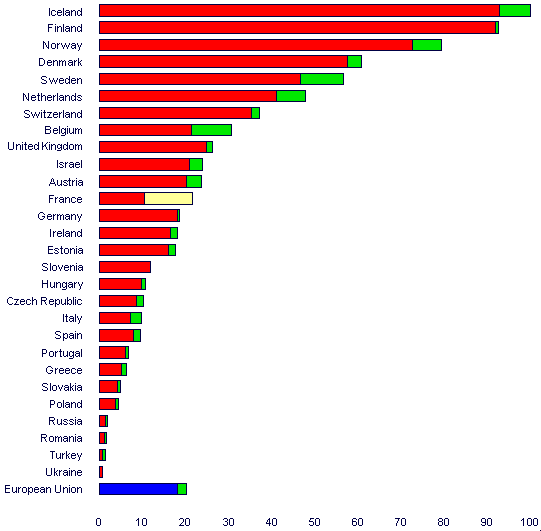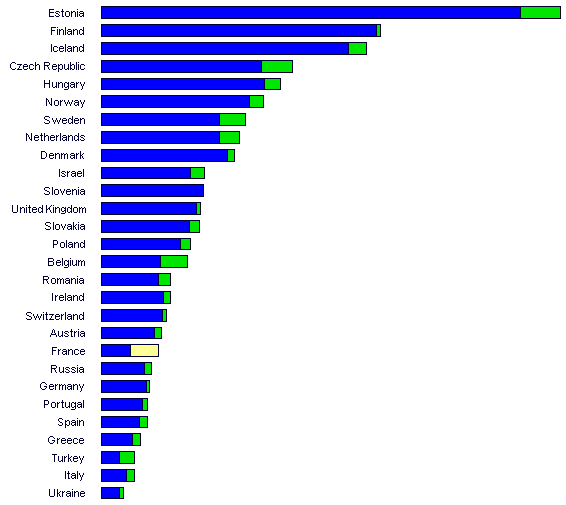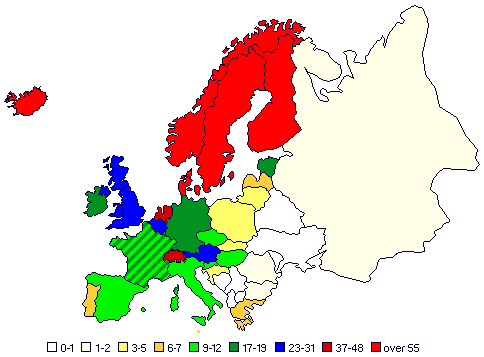 |
 |
1. Editorial: Nostalgia? |
|
|
Many of the people that were online five or ten years ago, before the internet started making headlines in mainstream media, are feeling a bit nostalgic. It's
like going back to a beach that we remembered quiet and secluded – and finding a noisy crowd.
Some of the old environment is gone forever. This is no longer the time of pioneers, the fraternity of the frontier, where people felt a bit special just because
they were communicating with an unusual tool. The internet is not yet "of all and for all ", but that's the way it's going; what we meet on the net is humanity in
all its styles and ways, sometimes intriguing, but often boring; a lot of the dialogue is more or less the same as in any bar or town square.
Even before the spreading of the internet, the online community was not exclusive or elitist. Anyone could join, as long as he or she had the curiosity – and
the patience to learn and use tools that now seem primitive, but worked quite well. But there were few of us and we felt close; it almost seemed that we
could all call each other by name (or nickname); we had the perception of being a community.
If we give in to nostalgia, we feel uncomfortable in the "mass internet". The cozy little inn were we used to meet seems to have turned into a supermarket or
a busy street, packed with an indifferent and anonymous crowd. But I don't think it's so.
I know several newcomers to the net. Most of them start by just treating is as a big library, or a tool for their work and a few practical needs; maybe a little
correspondence with their friends. But some, after a while, discover unexpected values: exploring, finding new people and new relationships. The same
things that attracted us when the net was small. They are probably a minority; but there are more every day – and these people with an extra touch of
curiosity, a taste for discovery and dialogue, are the heart and bloodstream of the net.
There is a persisting, even widening trend to use the internet as just another broadcasting medium or another sales outlet. It seems so easy – if we can tame
the new environment, force it into the familiar standards, why should we bother to think and learn? Millions of people, billions of dollars (or euros)... just
another "mass market" where we can reap some profits without bothering to learn new ways. But it isn't so.
We shouldn't be nostalgic; but we shouldn't forget what we learnt in those early days that now seem so remote. The most vital part of the net is still an
ever-growing tangle of small and large communities, evolving and changing, interweaving, cross-pollinating, that can still surprise us in unexpected ways.
This is a big opportunity for the people and the organizations that are willing to learn new ways of thinking, to develop new relationships. But sooner or later
it will be a problem for those who choose to ignore it or believe that they can fit it into old patterns.
back to top
|
 |
2. "The Caring Economy" (Gerry McGovern) |
|
|
There are so many books about the internet, or related subjects, that it's impossible to read them all. And many say the same things, repeat the same standard recipes, often based on technology rather than company strategy, culture or human relations. It's really refreshing to read the new book by Gerry McGovern – who is well known to regular readers of this newsletter, because I've quoted several of his articles.
The title sets the tone: The Caring Economy. This is, I think, a very relevant concept. Care is more important than ever in the economy that is developing with the new communication environment. This is how the author explains it:
There's nothing corny about caring. There's nothing weak about caring. It's what is going to differentiate many of the successful from the non-successful companies in the digital age. The days of cutting costs and milking companies for short-term gain are numbered. In this war of change, we need a long-term vision more than ever. We need to focus on the basics again: the customer. If we genuinely care about them and deliver to them products that reflect this caring attitude, they will in time care about us and become loyal to our brands. Together, we will have created a mutually profitable relationship.
This is not a "light" book. Its 380 pages are filled with interesting thinking and considerable knowledge. But it isn't difficult – and it isn't boring. It's well written, in a pleasant and easygoing style. Not a single page is wasted on unnecessary technicalities or electronic hype. It's not a book about technology, software and computer languages. It's about what really matters: people. It's about concepts that have always been basic in human communication and business management, but have a new meaning, a more immediate urgency, in a network environment. It's based on seven principles:
- The digital age demands new thinking and a new philosophy.
- The digital age requires a new set of business principles, governing everything from research and development to customer interaction.
- The digital age is about technology finally becoming transparent and people becoming paramount.
- In the digital age people have never been more educated, self-confident and empowered.
- People care. They care about themselves. They care about their family, their friends, their community, their country, their environment.
- Business needs to care about people if it wants long-term success.
- The internet is a revolution primarily in communication, not technology.
This – Gerry McGovern explains – is not a book about computers or the internet. It's not about information technology and e-commerce. It's not about more bandwidth and faster processors. It's not about digital television or video-on-demand. It's not about nerds and hackers. It's not a book about cost savings and downsizing and automating people out of the picture. "The Caring Economy" may cover and explore all these technologies and issues, but it's not about them. Rather, it's a book about people (business people and consumer people) and how they interact on the internet.
It's not a manual or a simplistic "how to" book. It doesn't offer pre-cooked solutions or set conventional standards to be imitated. It's a thorough and enlightening explanation of the new environment, the opportunities it offers, the principles and the criteria for success. And it also contains a number of practical suggestions.
So this is not "just another book on the internet". It's inspired and provocative, while soundly realistic; and it's based on what I think is the only relevant concept: caring, above all, about people and human values.
In my opinion it's one of the few books on this subject that are really worth reading.
back to top
|
 |
3. New numbers: something changing? |
|
|
Something is changing in the internet; even in "backward" countries like Italy. It's still difficult to understand which way it's going, but the feeling is that we are really entering a new phase. To understand this it will be useful to use several different sources; but let's start with an update of the trends that this newsletter has been following for nearly three years.
All types of analyses and statistics have problems; none are perfect or totally reliable. In the last few months the European hostcount data had some technical hiccups. The problem seems to be solved in the July data, that were published by RIPE (Réesaux IP Européens) on August 6, 1999.
These are figures in the 13 European countries with over 200,000 internet hosts, compared to the same month a year and two years earlier.
| |
1997 |
1998 |
1999 |
| United Kingdom |
899,938 |
1,321,905 |
1,594,533 |
| Germany |
933,850 |
1,308,706 |
1,526,265 |
| Netherlands |
344,707 |
533,135 |
746,309 |
| France |
311,985 |
447,153 |
618,852 |
| Italy |
250,450 |
357,919 |
553,221 |
| Sweden |
294,761 |
376,442 |
502,642 |
| Finland |
396,352 |
438,730 |
474,671 |
| Spain |
172,179 |
258,015 |
369,146 |
| Norway |
209,900 |
302,520 |
348,712 |
| Denmark |
137,495 |
200,433 |
317,706 |
| Belgium |
90,268 |
180,896 |
309,476 |
| Switzerland |
155,379 |
216,341 |
262,073 |
| Russia |
86,420 |
175,930 |
227,619 |
| European Union |
4,029,499 |
5,721,261 |
7,390,527 |
| Area total |
4,840,248 |
6,982,995 |
9,148,276 |
Once again, there are remarkable differences in the growth patterns. The UK and Germany remain far ahead of the rest, but there are considerable changes in several other countries.
Let's look at an update of the graph for the five large countries in the European Community:
Internet hosts in 5 European countries – 1996-1999
Source: RIPE (Réseaux IP Européens) – quarterly data – numbers in thousands
|
 |
| Note: the minitel factor in France is not considered in this analysis. |
Especially in the last twelve months the two leading countries have had relatively slower growth, but it's too soon to tell if the others are really beginning to catch up. The apparent "leap" of Italy's hostcount, following a decrease that was probably a matter of technical problems in the survey, is too short-lived, so far, to be meaningful. It will take another three months, or maybe more, to understand how the trends are changing.
There are some interesting developments and changes in the rest of Europe, as we can see in these figures.
Internet hosts in 32 countries in the Europe-Mediterranean area
32 countries with over 10,000 internet hosts (of over 100 covered by RIPE – Réseaux IP Européens)
|
| |
No. of hosts
July 1999 |
% change
in six months |
% change
in a year |
% of
"Europe" * |
Hosts per
1000 inhab. |
| Iceland |
27,083 |
+ 7.7 |
+ 28.0 |
0.3 |
99.9 |
| Finland |
474,671 |
+ 0.8 |
+ 8.2 |
5.2 |
92.5 |
| Norway |
348,712 |
+ 9.3 |
+ 15.3 |
3.8 |
70.4 |
| Denmark |
317,706 |
+ 5.4 |
+ 58.5 |
3.5 |
60.8 |
| Sweden |
502,642 |
+ 21.6 |
+ 36.8 |
5.5 |
56.7 |
| Netherlands |
746,309 |
+ 16.6 |
+ 40.0 |
8.2 |
47.8 |
| Switzerland |
262,073 |
+ 5.0 |
+ 21.1 |
2.9 |
37.1 |
| Belgium |
309,476 |
+ 42.9 |
+ 71.1 |
3.4 |
30.6 |
| United Kingdom |
1,594,533 |
+ 8.7 |
+ 20.6 |
17.4 |
26.3 |
| Israel |
134,380 |
+ 14.8 |
+ 39.8 |
1.5 |
23.9 |
| Austria |
190,080 |
+ 13.5 |
+ 24.8 |
2.1 |
23.6 |
| Germany |
1,526,265 |
+ 3.2 |
+ 21.8 |
16.7 |
18.6 |
| Ireland |
65,213 |
+ 9.9 |
+ 33.6 |
0.7 |
18.2 |
| Estonia |
26,892 |
+ 9.4 |
+ 34.0 |
0.3 |
17.6 |
| Slovenia |
22,926 |
– 1.3 |
+ 7.0 |
0.3 |
11.2 |
| Hungary |
108,664 |
+ 9.5 |
+ 27.3 |
1.2 |
10.8 |
| France |
618,852 |
– 0.7 |
+ 38.4 |
6.8 |
10.5 |
| Czech Republic |
105,286 |
+ 19.6 |
+ 48.0 |
1.2 |
10.5 |
| Italy |
553,221 |
+ 33.7 |
+ 54.6 |
6.1 |
9.7 |
| Spain |
369,146 |
+ 19.7 |
+ 43.1 |
4.0 |
9.4 |
| Portugal |
66,783 |
+ 13.3 |
+ 35.0 |
0.7 |
6.8 |
| Greece |
66,690 |
+ 25.6 |
+ 65.7 |
0.7 |
6.4 |
| Latvia |
16.029 |
+ 6.7 |
+ 67.5 |
0.2 |
6.3 |
| Slovakia |
25,848 |
+ 12.0 |
+ 38.7 |
0.3 |
4.8 |
| Poland |
165,877 |
+ 12.4 |
+ 50.2 |
1.8 |
4.4 |
| Lithuania |
12,107 |
+ 19.1 |
+ 26.5 |
0.1 |
3.3 |
| Croatia |
13,654 |
+ 72.3 |
+ 121.2 |
0.1 |
3.0 |
| Bulgaria |
15.369 |
+ 27.8 |
+ 83.7 |
0.2 |
1.8 |
| Russia |
227.619 |
+ 16.6 |
+ 29.4 |
2.5 |
1.6 |
| Romania |
31,957 |
+ 21.2 |
+ 60.2 |
0.4 |
1.4 |
| Turkey |
85,700 |
+ 83.8 |
+ 127.2 |
0.9 |
1.4 |
| Ukraine |
25,960 |
+ 26.0 |
+ 39.2 |
0.3 |
0.5 |
| European Union |
7,390,527 |
+ 10.6 |
+ 29.2 |
80.8 |
20.2 |
| Total "Europe" * |
9,148,276 |
+ 11.8 |
+ 31.0 |
|
13.0 |
* The RIPE area now includes over 50 non-European countries, but the number of hosts in those countries
is less than 2 percent of the total and doesn't have a relevant effect on calculations and statistics.
|
In spite of the changes, most of the internet is still concentrated in the central and northern part of Western Europe. Of all the internet hosts in the area (that includes Europe, the Near East and part of Africa) 80 percent are in the European Union. Two thirds in ten out of 100 countries: Britain, Germany, Benelux and Scandinavia.
There are considerable differences inside each of the areas. For instance in the Balkans (that at this time are a focus of attention in Europe and worldwide) Slovenia has a much stronger presence on the internet than any other country of ex-Yugoslavia; there is fast growth in Croatia; in Serbia, in spite of the crisis, the internet is still growing (though penetration is low: less than one host per thousand inhabitants); the other countries in the area are far behind – especially Albania. In the Near East there is an enormous gap between Israel and the other countries (only the Arab Emirates have a relatively high density – six per thousand).
Now let's look at the usual graphs, beginning with density.
Internet hosts per 1000 inhabitants in 28 countries
28 countries in the RIPE area with over 20,000 hosts – July 1999
|
 |
| The green slice of bars indicates growth in the last six months.
The yellow slice of the bar for France is an estimate of the minitel factor. |
The other Scandinavian countries are getting closer to Finland. The Netherlands and Belgium continue to grow much faster than the European average. Italy and Spain seem to be getting close to the higher levels in Eastern Europe, but they are still far behind the average in the European Union.
And now let's look at an update of the graph in relation to the economy (GNP).
Internet hosts in relation to income (GNP) in 28 countries
28 countries in the RIPE area with over 20,000 hosts – July 1999
luglio 1999
|
 |
| As in the previous graph, the green slice of bars indicates growth in the last six months.
The yellow slice of the bar for France is an estimate of the minitel factor. |
Italy is still very weak on this score – and so is France if we don't consider the minitel. Once again we see that Germany is weak in proportion to its economy, while some countries in Eastern Europe are very strong: especially Estonia, the Czech Republic and Hungary – but also Slovenia, Slovakia, Poland and Romania.
And finally – here is an updated map of Europe.
Internet hosts per 1000 inhabitants in Europe
Analysis on data by RIPE – Réseaux IP Européens – July 1999 |
 |
| The stripes on France represent the minitel peculiarity. |
As we have seen, the European density average is 13, just above the category shown here in pale green; the average in the European Union is 20, above the level of the dark green area.
| |